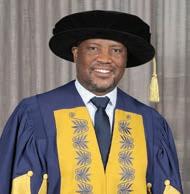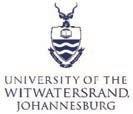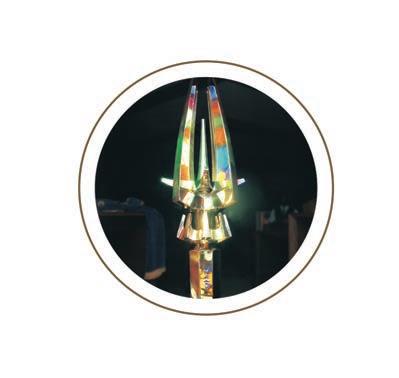PhD

Graduation Ceremony
Date: 26 March 2025
Time: 13:30
Venue: The Great Hall



Date: 26 March 2025
Time: 13:30
Venue: The Great Hall


CONGRATULATIONS! HALALA!
GO LEAD SOUTH AFRICA TO GREATNESS!
A hearty congratulations to the class of 2025! Some of you light shine for those who come after you! For those of you who are continuing in your family’s tradition, thanks for not dropping the ball. Education is the best self-investment. The past year changed the world as we know it, with no less than 60 countries and more than 1.3 billion people globally going to vote, including our own country. The outcomes have changed geopolitics, with the Global North becoming more internally focused. The resurgence of economic protectionism has altered trade landscapes, further reshapes the balance of power, as nations compete for supremacy in these tension. The race for control over natural resources, especially in the Arctic and other of Africa, we have chosen Solidarity, Equality and Sustainability as our G20 theme. This speaks to our recognition of the interconnected of nations. Our shared future depends on mutual understanding, cooperation, equality and stability across nations. As our future leaders you need to adapt to an uncertain world, embrace diversity, and foster dialogue. That will help you to craft a healthier, more balanced world for future generations.
As you venture into the world, take time to expand the depth and breadth of your knowledge. Read outside your specialisation, engage with people outside your comfort zone. Understand the plight of people less fortunate than yourself. Be the footprints worth emulating, are not only the brightest but also those who take time to learn from others, who are accountable for their actions and omissions, who use what they know and what they have, to make the world a better place. Leaders who care. Those leaders do this consistently with Humility and Integrity, Always. May you be those leaders! HALALA!
CONGRATULATIONS! HALALA! GO LEAD SOUTH AFRICA TO GREATNESS!
Chancellor

Congratulations on successfully completing your academic programme at the University of the Witwatersrand, the premier University on the continent.
You are now a member of an elite group of graduates of this august institution. More than 200 000 alumni at the cutting edge of excellence, both locally and internationally in business, the public sector, the academy, and in civil society have trodden this path.
Today, you become a member of this illustrious community.
Over the past 100 years, Wits has grown into one of the leading universities on the continent and a globally respected institution for its teaching and learning, knowledge creation and generation, and social impact. It has shaped the lives of many for the advancement of society. You are now an integral part of this proud and enduring legacy. Here at Wits, we actively pursue excellence and societal relevance in everything we do. From the abstract to the practical, our focus is on creating a space for the best thought, knowledge, and expertise to be unearthed and nurtured.
Wits is renowned for its intellectual leadership and for nurturing critical thinkers, creative innovators, problem-posers, and problem solvers. We have strived to match your ambition and drive to overcome the challenges thrown our way by the pandemic. Together we have reached the crest of the hill and proven, once again that excellence is achievable, even in times of uncertainty and adversity.
Your success has furthered our commitment to equipping the next generation of sustainable solutions to the pressing problems of the 21st Century.
As a Wits graduate, you had access to an exceptional educational experience. You have been exposed to a world-class academic and research programme and a vibrant community that makes you a true global citizen. You have been part of an institution that generates cutting-edge knowledge and innovation for South Africa and the world. It is now time for you to step into the world and use that experience, for good. We know that you will enter the next stage of your journey with the determination to build a better society tomorrow. I want to encourage you to remain a part of the Wits family by participating in our alumni programme and by further advancing the reputation of your alma mater.
Best wishes for the next steps of your journey and congratulations on being such a big part of the history of this illustrious institution.
FRS
Wits University
Gaudeamus igitur
Nos habebit humus.
Ubi sunt qui ante nos
In mundo fuere?
Vadite ad superos
Transite in inferos
Hos si vis videre.
Vita nostra brevis est
Venit mors velociter
Rapit nos atrociter
Nemini parcetur.
Vivat academia
Vivant professores
Vivat membrum quodlibet
Vivat membra quaelibet
Vivant omnes virgines
Faciles, formosae.
Vivant et mulieres
Tenerae amabiles
Bonae laboriosae.
Vivant et republica et qui illam regit.
Vivat nostra civitas, Maecenatum caritas
Quae nos hic protegit.
Quivis antiburschius
Atque irrisores.
Let us rejoice therefore
While we are young.
After a pleasant youth
After a troublesome old age
The earth will have us.
Where are they
Who were in the world before us?
You may cross over to heaven
You may go to hell
If you wish to see them.
Our life is brief
Atrociously, it snatches us away.
No one is spared.
Long live the academy!
Long live the teachers!
Long live each male student!
Long live each female student!
Long live all maidens
Easy and beautiful!
Long live mature women also, Tender and loveable
And full of good labor.
Long live the State
And the One who rules it!
Long live our City
And the charity of benefactors
Which protects us here!
Let sadness perish!
Let haters perish!
Let the devil perish!
Let whoever is against our school
Who laughs at it, perish!
Imake an announcement requesting guests, graduands and staff to keep calm and remain seated;
• The Ushers will assist guests to proceed to the nearest Emergency exits in order to evacuate the graduation venue in an orderly fashion;
• Emergency exit signs are visible, in red, above all exit doors situated on your left and right hand sides, as well as the back of the venue;
• The Ushers will assist the elderly and disabled guests out of the building;
• The academic procession on stage must exit through the back stage door;
• Once outside the graduation venue, all guests, graduands and staff must proceed to the main assembly point on the piazza.
IAll bomb threats will be treated as real in order to protect lives and property and the premises will be evacuated immediately.
Nkosi sikelel’ iAfrika
Maluphakanyisw’ uphondo lwayo,
Yizwa imithandazo yethu, Nkosi sikelela
Thina lusapho lwayo.
Morena boloka setjhaba sa heso, O fedise dintwa le matshwenyeho, O se boloke, O se boloke setjhaba sa heso, Setjhaba sa, South Afrika — South Afrika.
Uit die blou van onse hemel, Uit die diepte van ons see, Oor ons ewige gebergtes, Waar die kranse antwoord gee,
Sounds the call to come together, And united we shall stand, Let us live and strive for freedom In South Africa our land.
The Wits Choir has been around since 1995. Their repertoire is colourful and vibrant. They perform regularly at graduations and important ceremonies. The Wits Choir has toured internationally as well as playing host to other choirs here. They are also active in the community, undertaking choral outreach programmes.
26 MARCH 2025 AT 13:30
The audience will rise as the academic procession enters the hall and will remain standing until the Chancellor is in place
The Chancellor will constitute the congregation
The Chancellor will welcome the diplomates
Conferment of an Honorary degree on Ms Jennifer Glennie
Dr Jennifer Glennie will address the congregation
Granting of diplomas and certificates
The Acting President of Convocation will address the diplomates
The Chancellor will dissolve the congregation
The audience will stand while Ihele is played
Members of the audience are requested to stand while the academic procession leaves the hall and not to leave the hall before the end of the ceremony.
In the event of load-shedding or power cuts, the Great Hall may become totally dark until the generator comes into operation.
DEAN: PROFESSOR M MUSEMWA BA Hons (Zimbabwe) MA (Cape Town) PhD (Minnesota, USA) MASSAf
Postgraduate Diploma in Education
GALANE, Lesiba Joyce Deaf Education
GUMEDE, Sfundo Cebolenkosi (with Distinction)
HENDRICKS, Mireille Jane (with Distinction)
JOOSTE, Sandra (with Distinction)
LEKOLA, Lerato Martha
LUO, Mei June (with Distinction)
Postgraduate Diploma in Education in the field of Digital Education and Online Teaching
Postgraduate Diploma in Education in the field of Digital Education and Online Teaching
Postgraduate Diploma in Education in the field of Digital Education and Online Teaching
MADONSELA, Ntombifuthi Penelope Deaf Education
MAKWEMBERE, Sandra
MATHEBULA, Masedi Bridget (with Distinction)
MATLAKALA, Matjatji Frangelinah Johannah
MOHLALA, Stella Thapedi
MOROWANE, Sam Mokgapego
OFFOR, Ugochukwu
OTEGBEYE, Olumuyiwa
PHALAFALA, Moyahabo Given
SAMUEL, Olorunjuwon Michael
SHANGE, Mathews Smangaliso (with Distinction)
SIBIYA, Zanele (with Distinction)
SITHOLE, Mashango Phillemon (with Distinction)
SWAFO, Pheladi Selinah
THOBEJANE, Keletso Sheperd Tshehlakgolo
TJALE, Paul Kobela
Postgraduate Diploma in Education in the field of Digital Education and Online Teaching
Postgraduate Diploma in Education in the field of Digital Education and Online Teaching
Postgraduate Diploma in Education in the field of Digital Education and Online Teaching
Postgraduate Diploma in Education in the field of Digital Education and Online Teaching
Postgraduate Diploma in Education in the field of Digital Education and Online Teaching
Postgraduate Diploma in Education in the field of Digital Education and Online Teaching
Postgraduate Diploma in Education in the field of Digital Education and Online Teaching
Postgraduate Diploma in Education in the field of Digital Education and Online Teaching
Postgraduate Diploma in Education in the field of Digital Education and Online Teaching
Postgraduate Diploma in Education in the field of Digital Education and Online Teaching
Postgraduate Diploma in Education in the field of Digital Education and Online Teaching
TJEBANE, Motheo Meta (with Distinction)
XAKI, Odumo (with Distinction)
Postgraduate Diploma in Education in the field of Digital Education and Online Teaching
Postgraduate Diploma in Education in the field of Digital Education and Online Teaching
Postgraduate Diploma in Translation and Interpreting
MANYEDI, Lebogang Rose Interpreting
Postgraduate Certificate in Education in Senior Phase and Further Education and Training Teaching
AYOB VALLY, Safiyyah (with Distinction)
BHOOPAL, Mikyla Millee (with Distinction)
BODINI, Guido
CARRINGTON, Georgia Nicola (with Distinction)
DA ROCHA, Lara Marie (with Distinction)
DAS, Ruchira
DUVENAGE, Katherine (with Distinction)
FAKIER, Rayaan
FOURIE, Lourens Johannes (with Distinction)
GOVENDER, Priyanka (with Distinction)
GREEFF, Jesse
GREENBERG, Desire Ann (with Distinction)
GREYLING, Susan Hermien (with Distinction)
HANCOCK, Amy Jessica
HLATSJWAYO, Jonas Given
HUTCHINSON, Michael Dean
ISMAIL, Muhammad Dunyaal
JAVED, Seemal Fatima (with Distinction)
KEKANA, Pakane Relebogile
KESENI, Siphokuhle Cleopathra
KGOMO, Nancy Lebogang
LALL, Diyaa
LEBEA, Maite
LEGODI, Palesa
LICHAKANE, Tshegofatso Lucrecious
LOU, Suny Yan (with Distinction)
LUND, Dominic Michael
MABIJA, Nomahlubi
MAHANDANA, Lavhelesani
MAHLASE, Motsheko Adeline
MAIER, Deryn (with Distinction)
MAISA, Kamogelo Boitumelo
MAKATILE, Rachael Tebogo (with Distinction)
MALETO, Mapula Malebo
MANABENG, Mokgoroane Hunadi
MANJOO, Rushda (with Distinction)
MANTSHI, Nhlakanipho Wiseman
MANUGENI, Murendeni (with Distinction)
MARAIS, Geneé Kallista (with Distinction)
MARIPANE, Nerrisa Segodi (with Distinction)
MAROUN, Tyra Leah (with Distinction)
MARTELL, Bethan Gwen
MASHIFANE, Dimakatso
MATHIKHI, Mukhethwa Clementine
MATHODE, Mukondeleli Bennedictor
MATJIU, Ketumile
MATLEJOANE, Marnela Lesedi
MAZIBUKA, Zandile Precious
MDUTYANA, Siphenathi
MGIBA, Anikie Eunisa
MHLONGO, Gift
MJAJA, Sboniso Goodboy
MNCUBE, Londa Nokuthula La-Toya
MOGALE, Kutlwano (with Distinction)
MOHLALA, Kamogelo Mamabolo
MOHLALA, Lesley Julius Takatso (with Distinction)
MOJAKI, Boitumelo (with Distinction)
MOKGOBU, Karabo
MOLELE, Zanele
MOLOTO, Baatseba Adelaide
MORDEN, Cecile Roseline
MOTSHEGOA, Pleasure Lesego
MSIZA, Lisa Nondumiso
NAIDOO, Serena
NDLOVU, Amanda Surrender
NDLOVU, Fortune
NDLOVU, Kamohelo Palesa Sympathy
NDLOVU, Zinhle
NGCONGWANE, Ayanda Lerato
NGWENYA, Norah Nonhlanhla
NKOSI, Charity Danile
NKOSI, Musa
NTLADI, Mmaneng Mercy
NTSIMANE, Reneilwe
NYAMA, Makhuparetjia
NYAMBI, Nicholas Sipho
PAHAD, Raeesa
PANDY, Wayde Roderick (with Distinction)
PHETLA, Maite Thapelo
PLATANA, Nanza Sikho (with Distinction)
POLLIACK, Jesse
RAKGWALE, Kamogelo
RAMARUMO, Ndivhuwo Martha
RANTLHWATLHWA, Tshegofatso
RIDLEY, Jonathan Patrick (with Distinction)
ROERING, Katherine Elizabeth (with Distinction)
ROSEN, Aviva
SEBALO, Oupa Noge Gregory
SHAZI, Nontokozo Precious
SIEFF, Adina Sara
SITHOLE, Ennocent Dingani
THABA, Tebele Caroline
TONI, Buhle
TURNBULL, Cailin Louise (with Distinction)
VAN ZYL, Albertus Stephanus
VILAKAZI, Thabang Phuqu
YOUNG, Jade Sophia (with Distinction)
ZARDAD, Tasniem
ZONDO, Mamohlolo Elizabeth
DE BEER, Rochelle (with Distinction)
MNCWABE, Hlengiwe (with Distinction)
MOAHLODI, Ntsoaki Ethel
MODIBELA, Letta Goemamang
MODISE, Mapula Jacqutline
MOELA, Daleen Martha Dorothy (with Distinction)
MOHAMED, Aseema Sulaman
MOKOTEDI, Kgomotso
MOKWA, Merriam Kedibone
MOLEFE, Dianah Mmule
MOLO, Sharon Nomathamsanqa
MONNAKGOTLA, Philisiwe Rosemary
MPAMONYANE, Kgethego
MSIMANGO, Linda Nombuso
MTHEMBU, Lindelwa Nothando
MTHOMBENI, Octavia
MTSHALI, Fikile Tolerance
MUHADI, Bellina
MVULA, Thokozani
NAIDOO, Alisha
NCUBE, Dimakatso Lorraine
NDLOVU, Lungile (with Distinction)
NHLAPO, Duduzile Theodora Felicity
NKWANA, Dorah Mapaseka
NONXUBA, Nomvuyo
NTABENI, Babalwa Grace
NTOMBELA, Bonisiwe Immagulate
NTOMBELA, Ignatia Bongekile
OHLSON, Dalene Bridgette
PADAYACHY, Aneshni (with Distinction)
PAUL, Kimm
QUNTA, Veronica Lindiwe (with Distinction)
RAGWALA, Nqobile Tsireledzani (with Distinction)
RAKHEBA, Mpolokeng Esther (with Distinction)
RAMATSI, Palesa Rose (with Distinction)
RAMATSITSI, Thokozile
RYAN, Bernedicta Natalie Faith
SETHOLE, Thoko Tinny (with Distinction)
SIHADI, Maatamela Patricia
SIHLALI, Nombuso Lindiwe
SILIMELA, Mpfariseni Ambrocia
SINGH, Janine Candice (with Distinction)
SINGO, Innocentia
SKOSANA, Mamarokho Martha
SMOUS, Andrinah Mahappy
SOMNISO, Thandiwe Portia
STEFANE, Monica Busisiwe
THIPE, Kelefilwe Winny
TSHABALALA, Mathapelo Diana Mathapelo
TSHIFURE, Susan
VAN STADEN, Maria Magdelena
VAN ZYL, Udine (with Distinction)
VHULAHANI, Nyambeni Mildret (with Distinction)
ZUMA, Lydia
BESTER, Sybrand Jacobus (with Distinction)
DLADLA, Wiseman
KHUMALO, Maipato Babygirl
KUBEKA, Gcina Siphesihle
MABIZELA, Hlengiwe Ayanda Sweetbetter
MADELA, Bongiwe Wenzile
MAJOLA, Mondli Thuthuka
MAKAE, Simukelo Zethemba
MANGWANE, Charity Keikgethetse
MDUNGE, Khethiwe Annapretty
MLANGENI, Busisiwe Janet
MNGOMEZULU, Sithabile Zinhle
MOKOENA, Zacharia Elliot
MPANZA, Sifiso Patrick
MVUBU, Lucia Gugu
NKOSI, Siphamandla Percival
NXUMALO, Ayanda Brightness
NYEMBE, Sipho Prince
SIHLANGU, Siphiwe Pat
SIHLONGONYANE, Nozipho Xolisile
Ms Glennie was born in Johannesburg in 1950. She graduated from Wits with a first-class Honours degree in pure mathematics in 1971. After three years as a mathematics teacher abroad, Ms Glennie returned home in 1974 and joined SACHED, the SA Committee for Higher Education. She co-led the team that produced learning materials for the out-of-school youth affected by the 1976 Soweto revolt. This evolved into People’s College, a weekly 24-page newspaper supplement carried in Weekend World, serving townships countrywide. The apartheid regime reacted to this successful programme by imposing five-year banning orders on the Editor of World, the SACHED Director, and the head of People’s College in October 1977. Donors wondered if this was “the end of SACHED”. But Ms Glennie delayed her planned further studies abroad and, aged 28, took over as SACHED Director, responsible for all programmes and eighty employees in four centres across the country. Over eighteen months, she consolidated the organisation and facilitated the recruitment of its new Director.
She completed her postponed MA in Education and Development at the University of London in 1980. After returning to SA, she set up the evaluation capacity at Wits for the new academic support programmes in several faculties and rejoined SACHED as Deputy Director. Over the turbulent 1980s, she guided SACHED’s sustainability and further growth, including new programmes such as Upbeat youth magazine and Khanya College, a recognised preparatory year for university.
In 1993, Ms Glennie became the founding Director of the South African Institute of Distance Education, SAIDE, a new NGO committed to further open learning principles, foster distance education strategies, and enable the use of modern technologies.
In SAIDE, a first dimension of Ms Glennie’s leadership has been strengthening distance education at the tertiary level to enable faster, more accessible transformation in the sector. Ms Glennie’s first major project was an international review of distance education in South Africa. It identified the changes required to improve completion rates and re-orient staffing and academic offerings to the needs of post-apartheid South Africa. The review also provided a vision of high-quality distance education, upon which SAIDE drew to develop quality guidelines for distance education for the Department of Education. SAIDE has grown over thirty years into a leading institution in its field.
In 1996, Ms Glennie initiated NADEOSA, the National Association of Distance Education and Open Learning in South Africa, a forum of some 65 institutions that at the time were involved in private and public distance-learning provision. NADEOSA recently held its 27th congress under the theme “student success”, confirming its institutional strength supported by SAIDE and crucially through Ms Glennie’s continuing involvement. SAIDE helped NADEOSA develop quality guidelines and case studies of good practice. This has been a second dimension of Ms Glennie’s leadership role, bringing student success to the fore in open learning institutions across the higher education sector.
The third dimension has been Ms Glennie’s expanding role in higher education governance.
As NADEOSA’s inaugural President, she served on UNISA’s post -1994 Broad Transformation Forum, followed by three terms on the UNISA Council and its audit committee. In 1998, she was appointed by the Minister of Education to the new Council for Higher Education. Internationally, from 2006 to 2012, she represented South Africa on the Board of Governors of the Commonwealth of Learning, rising to be Vice-Chairperson. She served on the Minister’s review of higher education funding and then chaired the CHE’s subsequent exercise.
She was chosen by the Minister in 2013 to Chair the interim Council to set up the new Sol Plaatje University in the Northern Cape. Its new Council took office in August 2014, with Ms Glennie as the Deputy Chair. It opened with 126 undergraduates in 2014 and has expanded to some 3500.
More recently, through SAIDE’s Siyaphumelela (“We succeed”) programme, Ms Glennie has facilitated collaborations across SA universities to analyse student data towards interventions for improving success. Funded by the Kresge Foundation and strategically overseen by Ms Glennie, the venture has grown to include 17 universities, with Wits as a founding member.
Standing out in its inspiration, originality, and reach is the SAIDE African Storybook initiative, representing a fourth dimension of Ms Glennie’s leadership. Guided by Ms Glennie, it uses education technology to enable home-language early reading. Because of traditional publishing costs, most African children never read a book in their own language, damaging their progress to literacy and sense of cultural identity. Started in 2012, using online technology widely available to teachers and librarians, the project by now provides free access to 4000 unique storybooks in 6000 translations covering 240 languages used across 30 African countries. In South Africa, over a million copies have been distributed to schools as part of special “classroom libraries”. African Storybook won the Education section and then the Winner of Winners Prize of the global Tech4Good competition. The African Storybook initiative gives continent-wide meaning to decolonising education and the pursuit of social justice that has driven Ms Glennie’s work
Ms Glennie’s work has been recognised nationally and internationally. In 2002, she was appointed a Fellow of the International Commonwealth of Learning. In 2007, she received the Chancellor’s Medal from the University of Pretoria for her contribution to education. In 2024, she received the African Council for Distance Education Legacy Service Award for exceptional contribution to the field of Open Distance and e-learning.
Over a fifty-year period, Jennifer Glennie has made an outstanding contribution to education and social justice in South Africa. Through a range of strategic and innovative education programmes and institutions, she has played a pivotal role in opening access to quality education at all levels for marginalised communities in South and Sub-Saharan Africa. Her major contributions have been in strengthening distance education at tertiary level to enable faster, more accessible transformation in the sector; bringing student success to the fore in open learning institutions across the higher education sector; significant governance contributions in South Africa’s higher education sector; and using education technology to enable home language early reading.
Jenny Glennie has shown remarkable visionary and forceful leadership, yet is supportive and inclusive, coupled with executive skills, a rare combination. Her lifelong efforts in South Africa and beyond have anticipated and exemplify the fourth Sustainable Development Goal, which is to “Ensure inclusive and equitable quality education and promote lifelong learning opportunities for all.” She is a role model for educationalists everywhere, and therefore, it is befitting that the University of the Witwatersrand, Johannesburg bestows an Honorary Doctorate degree on Jennifer Glennie.
Prizes to be presented at the Faculty’s prize giving ceremony
Deaf Education Community Service Award: For exceptional service to the Deaf community
Nomahlubi Mabija
National Association of Professional Teacher Organisation of South Africa Prize: For outstanding ability in the teaching of Commercial subjects (PGCE)
Suny Yan Lou
National Association of Professional Teacher Organisations of South Africa Prizes: For the best student in PGCE programme
Suny Yan Lou
National Association of Professional Teacher Organizations of South Africa Prizes: For outstanding ability in teaching Mathematics and Science subjects (PGCE)
Kutlwano Mogale
Chancellor
DR NJ DLAMINI MBChB (Natal) DOH (Free State) MBA (Witwatersrand) DBL (Unisa) PGCE (Witwatersrand) IEC (Stanford-USA)
Vice-Chancellor and Principal
PROFESSOR Z VILAKAZI BSc (Manchester) MSc PhD (Witwatersrand) FRS, FAAS, MASSAf
Chairman of Council
MR I SHONGWE BA (Wesleyan) MPhil (Oxford)
Senior Deputy Vice-Chancellor (Academic)
PROFESSOR R OSMAN BA (Witwatersrand) HDipEd BEd (Unisa) MEd PhD (Witwatersrand) MASSAf
Deputy Vice-Chancellor (Research and Innovation)
PROFESSOR L MORRIS BSc (Hons) (Witwatersrand) DPhil (Oxford) FRSSA FAAS MASSAf
Deputy Vice-Chancellor (Systems and Operations)
PROFESSOR IR JANDRELL BSc (Eng) GDE PhD (Witwatersrand) IntPE(SA) PrEng FSAAE FSAIEE SMIEEE
Deputy Vice-Chancellor (People Development and Culture)
PROFESSOR G STEVENS BA (Cape Town) BA Psych Hons MPsych (Western Cape) DLitt et Phil (Unisa), MASSAf
Registrar
MS CG CROSLEY BA HDipEd (Witwatersrand) BEd Hons (Unisa) MEd (Witwatersrand)
Chief Financial Officer
MS MM MANYAMA CA (SA) BCom Accounting (Cape Town) BCompt Hons (Unisa) BCom Hons Taxation (Pretoria) MBA (GIBS)
Dean of Student Affairs
MR JAP SEPTEMBER BA MPhil (Cape Town)
DEANS OF THE FACULTIES
Faculty of Commerce, Law and Management
PROFESSOR J COHEN BCom Hons PhD (Witwatersrand)
Faculty of Engineering and the Built Environment
PROFESSOR T MAJOZI BScEng MScEng (Natal) PhD (UMIST) CEng PrEng FIChemE FAAS MASSAf FWISA FSAAE
Faculty of Health Sciences
PROFESSOR SA MADHI MBBCh MMed PhD (Witwatersrand) FCPaeds(SA) MASSAf, RSSAf, TWAS, CBE
Faculty of Humanities
PROFESSOR M MUSEMWA BA Hons (Zimbabwe) MA (Cape Town) PhD (Minnesota, USA) MASSAf
Faculty of Science
PROFESSOR N CHETTY BSc Hons (Natal) MS PhD (U. Illinois Urbana-Champaign) MASSAf, MSAIP
President of Convocation
MS K MUFAMADI BA LLB LLM (Witwatersrand)
The Faculty of Humanities is a leading, vibrant, dynamic centre of teaching and learning as well as a hub of academic and research excellence on the continent.
Our students undergo rigorous theoretical and methodological training which imparts strong research and analytical skills and enables them to adapt, and often define, the constantly changing world of work. Our students learn to think critically – they are problem-posers, problem-solvers, and active social citizens who make a difference in society. The Faculty has a student-centred ethos which simply means that through its Teaching and Learning Unit, it offers student support in a timely manner and ensures that it is relevant to students’ needs; helps student develop a strong sense of purpose and assists students to recognise the value of their humanities degree.
The creative suite of programmes on offer in the Faculty equips our students to compete globally and to act locally. To this end, the Faculty engages creatively and critically with its location in Johannesburg – South Africa’s most globally networked city – taking advantage of its dynamic political, social, economic, and cultural links to the rest of Africa and the world.
The Faculty drives innovation in our undergraduate and postgraduate studies by encouraging multi-disciplinary, cross-disciplinary, inter-disciplinary and trans-disciplinary programmes that link the arts, social sciences, natural sciences, engineering, health sciences, education, and law. To this end, we have collaborative degrees in Digital Arts, E-Science, , Public Health, and Law. Given that Wits is a research-intensive university, the Faculty is steadily increasing its post-graduate enrolments in order to innovate and service the needs of our fast-changing world. The Humanities Graduate Centre is a home for collaboration and public intellectual activities where students are active participants.
The Faculty offers a wide range of research-oriented programmes, including professional degrees. Collectively, our programmes impart skills that offer graduates access to a range of careers across a variety of professions in the public and private sectors, including, academia, research institutes and science councils, governmental and non-governmental organisations, civil society, and corporate enterprises, amongst others.
Renowned for its distinguished academics and scholars, the Faculty is home to globally acclaimed and emerging scholars working at the horizon of the knowledge economy. Its cosmopolitan mix of international and local staff are located in a number of disciplines that are highly ranked across a range of global higher education measures. It is home to more than 70 researchers rated by the South African National Research Foundation as having national and international standing. Our scholars are innovating at the leading edge of research in the areas of African art, area studies, cities and housing, human migration, diversity and difference, critical race studies, violence, gender and sexuality, cultural studies, trans-languaging, narrative, and labour/work, etc. Our mission is to develop and advance globally impactful scholarship on the questions that define and disrupt what it means to be human in the twenty-first century.
The Faculty comprises five schools, namely, the Wits School of Social Sciences, Wits School of Education, Wits School of Arts, the Wits School of Human and Community Development and the Wits School of Language, Literature and Media. The Faculty boasts a number of prestigious research institutes and groups including the ; the Wits Institute for Social and Economic Research; the Centre for Researching Education and Labour; the History Workshop; the African Centre for Migration and Society; and the Wits Centre for Diversity Studies and Society, Work and Politics.

1. In the event of an emergency and/or fire:
The presiding official (Chancellor/Vice-Chancellor/Deputy Vice-Chancellor) will make an announcement requesting guests, graduands and staff to keep calm and remain seated; The Ushers will assist guests to proceed to the nearest Emergency exits in order to evacuate the Great Hall in an orderly fashion; Emergency exit signs are visible in red above all exit doors situated on your left and right hand sides as well as the back of the Hall; The Ushers will assist the elderly and disabled guests out of the building; The academic procession on stage must exit through the back stage door; Once outside the Great Hall all guests, graduands and staff must proceed to the main assembly point on the piazza.
2. In the event of a Bomb threat
All bomb threats will be treated as real in order to protect lives and property and the premises will be evacuated immediately.

doubt that graduation is one of them!
Today, you enter the world as a graduate from one of the top universities on the African continent. You enter into a world with limitless possibilities. May you meet all the challenges and opportunities that await you with pride, drive, passion, innovation, social-conscience and positive-purpose. In addition to earning the degree conferred upon you today, you have also earned Wits University. Convocation represents all the degreed graduates of Wits and forms a vital link between the University and the global community in which it operates. members, to convey to the University management your views about the University. This membership comes with several unique privileges, which include nominating the Chancellor of the University. The Convocation Executive has two members on contact with the University to ensure the voice of the Convocation is represented at the highest levels of The University.
There are approximately 250 000 Wits alumni worldwide. The distinction of our university and enhance the value of your degree by promoting Wits’ image, preserving our values, and contributing towards our ongoing development, ensuring that we grow in stature as a globally competitive, proudly South African institution of higher learning. connected with us so you can access career support, receive invitations to events and reunions and have sight of all the latest news about Wits and prominent Witsies: www.wits.ac.za/alumni/updateyourdetails/
M M
Wits University

C is a statutory body that includes all graduates of the University. Convocation is the largest constituency is to “… discuss and state its opinion upon any matters relating to the University including matters referred to it by the Council” and allows for the views of graduates to be represented at the highest levels of governance of the University.
Anhom
Falalala
Obani labo?
Baphi Ahhom?
Ngibona beza
Beyikazela
Bathwel ‘ongiyane
Bavela kuphi na?
Obani labo?
S P M
Who are those?
Which, Falalala?
I see them coming
Walking with swinging garments
They are wearing head rings
Where do they come from?
Who are those?
They are people with knowledge
They are people in authority
These are the ones
Ongqondongqondo
Osibakhulu
Yibo labo hhom!
Yini na leyo?
Ihele
Ihele lezingwazi zakithi
Ahhom udwendwe
Ahhom
Udwendwe lwezingqwele zakithi
Nant’ ihele
Longqondongqondo
Nant’ ihele
Losibakhulu
Udwendwe
Udwendwe Iwezingqwele zakithi
What is that?
It is a procession
A procession of our heroes
It is a procession
A procession of our champions
Here is a procession
Of people of knowledge
Here is a procession
Of people of knowledge
A procession
A procession of our heroes
Ihele is known as the ‘Black’ Gaudeamus Igitur. In song, the writer, Mnomiya uses very poetic language to describe a graduation ceremony. The soloist sings of the ‘strange’ procession of people in long robes and head gear. The choir responds by saying that these people are academics who read profound books of knowledge. Mnomiya goes on to say that the graduates are an inspiration to all of us, and we will also graduate like them one


Maces were originally weapons of defence, designed to break through armour. In medieval times, bishops carried a mace instead of a sword into battle to enable them to defend themselves in accordance with the canonical rule that forbade a priest to shed blood. In time, the mace has come to be regarded as a symbol of delegated authority vested in a person or an institution. At this University, it is a symbol of the authority vested in the Chancellor and a reminder of the mandate given by the legislature of this country to the University to grant degrees.
The University mace is the work of the Edinburgh designer, silversmith and engraver, institutions. It is silver-and gold-plated, is 1070 millimetres long and 180 millimetres broad character of this University as an institution of learning, set in a mining centre within the Republic of South Africa.
The head of the mace with its spreading vertical blades is symbolic of the horns of a springbok. The central vertical spike is representative of a rock drill on the mine, and the amber stone set in the head is intended as a tribute to a past Chancellor through its association with his name, Bernstein, which in German means amber stone. The heavy quality of the head is consistent with the traditional concept of the mace as a weapon of defence. The collar repeats the shape of the head. It consists of eight cogs which symbolise the cog-wheel in the University coat of arms and represents mining and industry. The shaft is octagonal and divided into three sections. The coat of arms of the University is placed on the shaft under the collar. Below this the words Universitas Witwatersrandensis Johannesburgi: are inscribed, followed by the date in Roman
The mace is a symbolic portrayal of this University, this city, the Witwatersrand and the Republic of South Africa. It is a constant reminder to members of Council and Senate to uphold at all times the rights, powers and privileges of the University and its governing bodies.
The academic dress of this University is patterned on that of the Universities of Oxford of degreesof bachelor and master.
D O
• The Chancellor wears a scarlet silk gown with a broad facing of black velvet down each side, embroidered in gold and a black velvet cap with gold cord and tassels.
gold silk down each side, embroidered in blue, the sleeves being lined with gold silk. The cap is of the same design as that of the Chancellor.
• The Chairman of Council wears a black silk gown with a broad facing of red velvet down each side and around the neck, the sleeves being lined with gold silk. The cap is of the same design as that of the Chancellor.
facing and sleeves of the gown and of the cord and tassels of the cap is silver-grey.
silk down each side, the sleeves being lined with white silk. The cap is the same as that of the Chancellor, but with a blue cord and tassels.
• The Registrar wears a black silk gown with a broad facing of blue silk down each Convocation.
• A member of Council wears a black silk gown with a broad facing of gold silk. The cap is the same as that of the Chancellor.
broad facing of blue satin.
G G
• The gowns for all degrees of bachelor and master of the University are black, of the same pattern as the gown for a Master of Arts at the University of Oxford.
London pattern.
facing on each side of the gown and with the sleeve button and cord in gold.
T A H
The academic hood is the principal feature of the costume for holders of our degrees which the degree was obtained. It is scarlet silk, lined with white silk.
D C
As a 102-year-old public university in South Africa, Wits is proud of its record of
able to tackle problems using evidence-based solutions. We also engage with our communities to share knowledge that we create so as to make a positive impact on the quality of life. Wits for Good.
Wits is a world-class research-intensive university based on our intellectual excellence, international competitiveness, and commitment to social justice; all of which have a measurable impact.
Here are a few of many differentiators:
• An international perspective that helps us maintain high standards in teaching and learning and research while not distracting us from our place countries other than South Africa.
• An intellectual hub of Africa, a founding member of the African Research in Africa, including 32 articles with Namibia, 61 with Botswana, 87 with
• An active and engaged community leader that takes a stand on social issues and is fully committed to the advancement of the public good.
• A growing contribution to the body of knowledge through peer reviewed
•
• particle physics and the Higgs Boson, malaria, archaeology, paleontology, paleoanthropology, violence, local and regional politics, geochemistry, rock mechanics, deep mining, forensic anthropology, climate change, migration, social justice, and many more.
•
• postgraduate studies and learning to make their own unique contributions to the global knowledge base.
• obtain permanent employment within 12 months of graduation.
• efforts, with contributions exceeding R 2 billion per annum.








































































